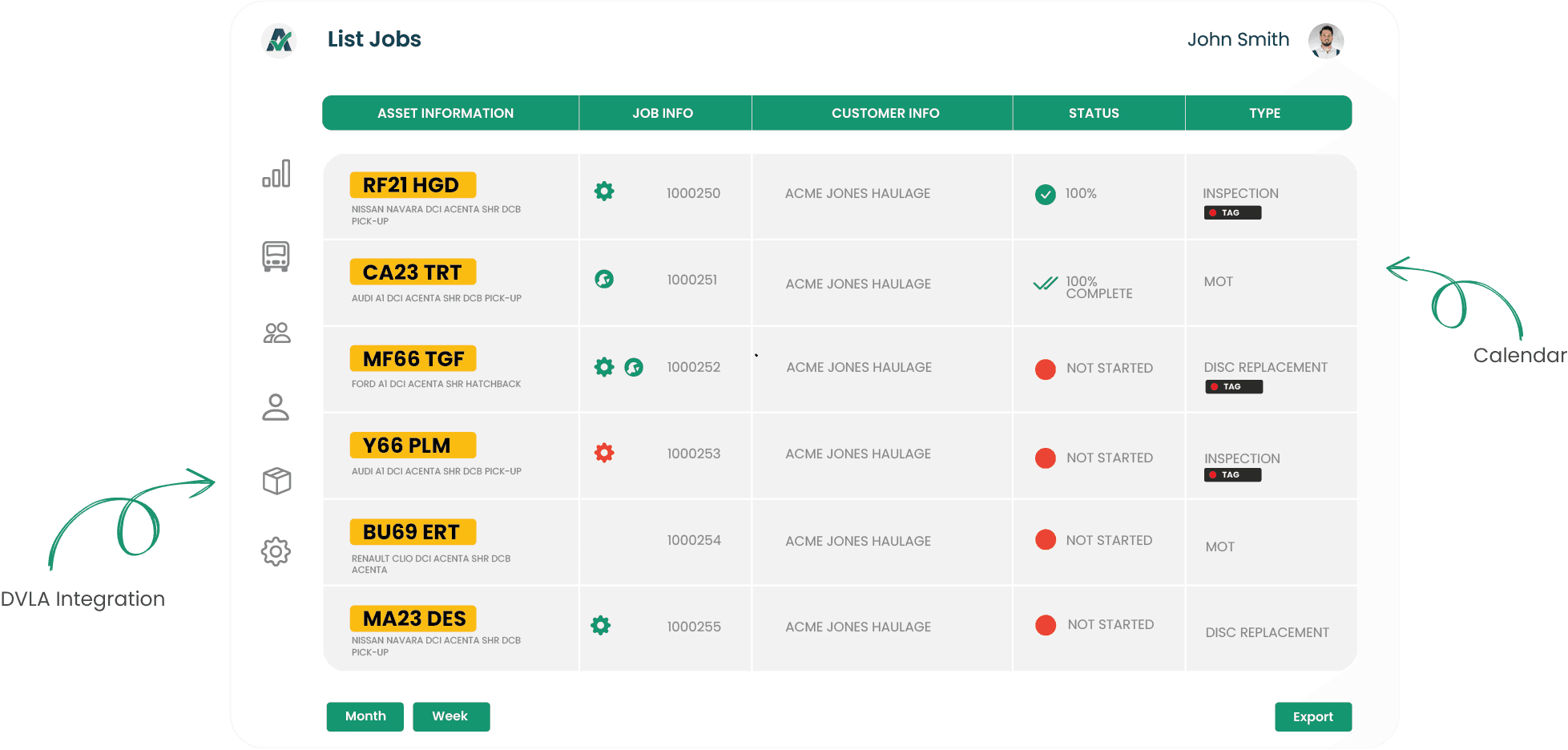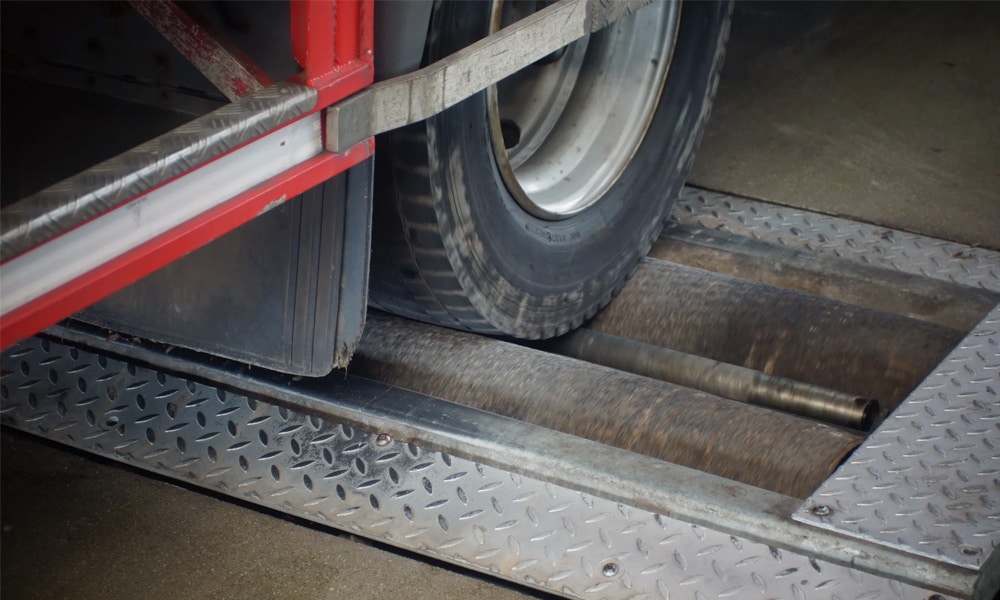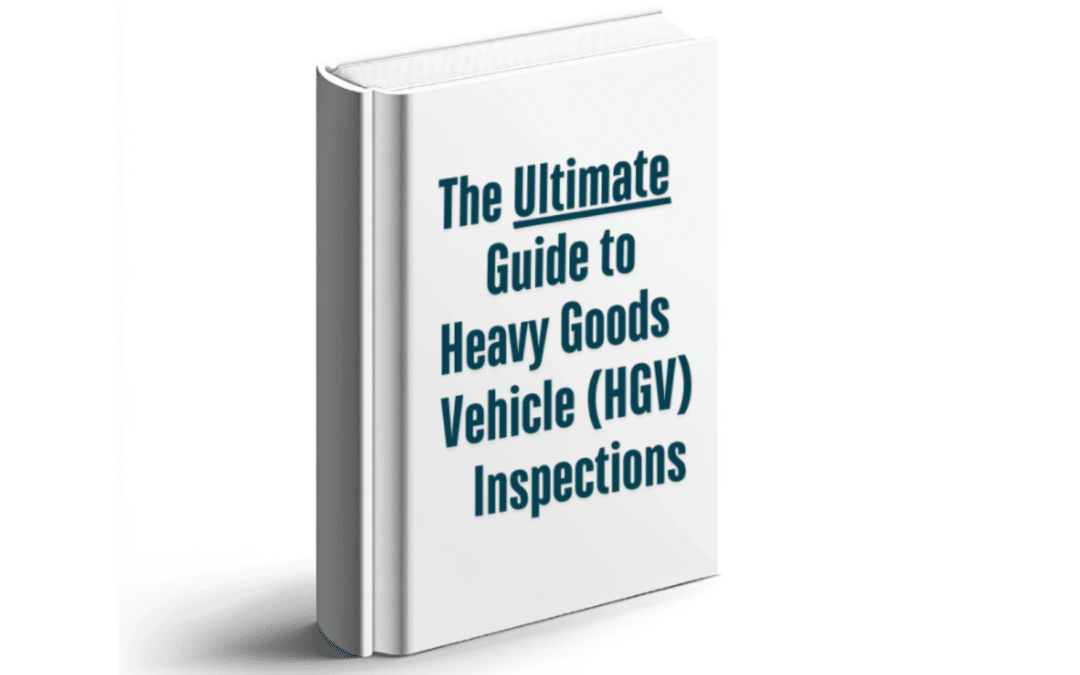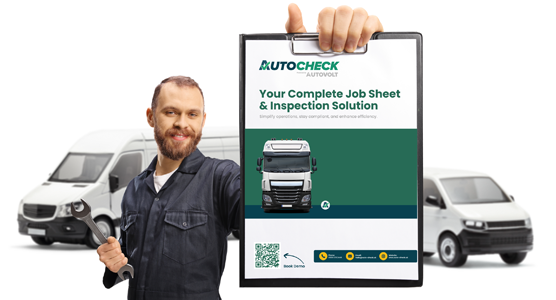autocheck software >
Fleet Maintenance Software: A Complete Guide for Workshops
Fleet maintenance software is becoming essential for staying compliant and reducing downtime. As you know, looking after a fleet of vehicles, whether that be vans, HGV’s or plant machinery involves far more than booking the occasional service. It’s a constant balancing act of compliance, cost, efficiency and downtime. Whether you’re responsible for a handful of vans or a national fleet of trucks, having the right asset maintenance system in place can make all the difference.
This guide explains what a modern fleet maintenance platform can do, how it supports compliance, and why moving away from spreadsheets or paper is now a practical necessity.
What Is Fleet Maintenance Software?
Fleet maintenance software is a digital platform designed to help businesses organise, track and manage the upkeep of their vehicles. It replaces the fragmented processes of spreadsheets, paper job cards and calendar reminders with a structured, centralised system.
Instead of chasing down MOT dates or scrambling through binders for past repairs, transport managers can access everything from one dashboard. Vehicles, inspections, repairs, defects and documents all live in one place.
Most of today’s systems are cloud-based, so your team can work from anywhere whether that’s the office, depot or roadside.
Who Should Use a Fleet Maintenance Platform?
If you manage or maintain commercial vehicles, fleet software can help you work more effectively. This includes:
-
- Haulage companies overseeing HGVs, trailers and plant
- Public service vehicle (PSV) operators running buses or minibuses
- Construction and hire firms with mixed fleets
- Vehicle rental and lease businesses
- Owner-operators aiming to stay on top of compliance
- In-house workshops supporting operational fleets
Even small businesses with fewer than ten vehicles can benefit. A digital system often pays for itself quickly by preventing missed inspections, reducing admin, and simplifying compliance checks.
Core Capabilities of Fleet Management Software
You’ll often see long feature lists, but it’s worth looking at how those tools actually help in practice.
Plan and Track Inspections
A key task is scheduling periodic safety inspections. Good software will allow you to create a repeat schedule based on time or mileage, send alerts, and show upcoming checks across the whole fleet.
Manage Workshop Jobs
Whether you have your own technicians or use third-party providers, maintenance software should let you assign work, log technician hours, capture defects, and track the status of each job from start to finish.
Handle Defect Reports
Drivers should be able to record faults easily using an app or web interface. From there, defects should be reviewed, assigned for repair, and marked as completed. The full audit trail must be stored.
Store Essential Records
Software must provide secure, structured storage for inspection reports, MOTs, V5s, maintenance contracts and driver check records. Having these accessible at short notice is vital during DVSA audits.
Real-Time Dashboards
Live dashboards give transport managers a clear view of fleet health. You can see which vehicles are overdue for inspection, how many are off-road, and what repairs are outstanding.
Multi-Depot and Technician Controls
If you operate across different locations, it’s important to assign tasks by depot and manage user permissions effectively. Maintenance software should support this.
Integrations
The best systems integrate with DVLA to pull vehicle data or connect with telematics systems for live mileage and performance data. Some platforms also include parts inventory, hire desk, and purchase order functions.

DVSA Compliance and Operator Licence Requirements
More than just convenience, fleet software helps you meet your legal obligations. The DVSA outlines that:
-
- Vehicles must be maintained in a fit and serviceable condition
- Safety inspection records must be kept for 15 months
- Inspections should be based on a documented schedule
- Daily walkaround checks must be recorded properly
- Defects must be reported, investigated, and resolved
Using a fleet maintenance system means this can all be logged, tracked, and shared with inspectors where needed. It makes enforcement visits less stressful and shows you’re operating responsibly.
Digital tools also make it easier to identify issues before they result in prohibitions or roadside failures.
Business Case: Saving Time, Reducing Risk
There’s also a strong business case for going digital. Missed inspections and unscheduled downtime are expensive. Paper-based processes waste time and often lead to duplicated effort.
Fleet maintenance platforms help you:
-
- Avoid missed inspections through automatic reminders
- Improve job turnaround times
- Reduce admin by eliminating double entry
- Simplify audit preparation
- Spot trends in recurring faults
Identifying trends helps address root causes and saves money long-term—whether it’s a recurring brake issue or patterns in tyre wear.
Why Cloud-Based Software Makes Sense
Most fleet management tools are now cloud-hosted. This avoids the need for complex installations or local servers and ensures your system is always up to date.
Benefits include:
-
- Anytime, anywhere access
- No manual backups required
- Regular updates with new features
- Quick rollout across teams and depots
Cloud systems are scalable too—whether you’re running a single depot or hundreds of vehicles across the UK.
Choosing a System That Fits
Not all fleet software is equal. Here are some considerations when choosing the right platform:
-
- Is it easy to use for both admin and workshop staff?
- Does it support your inspection types (e.g. LOLER, tanker checks)?
- Can you customise user roles and permissions?
- Is the support team UK-based and familiar with DVSA expectations?
Look for platforms that allow flexibility and can scale with your business.
How Autocheck Supports Fleet Operators
Autocheck is a browser-based maintenance system designed for workshops and transport managers. Built with input from operators, mechanics and compliance specialists, it gives full control over fleet health and job tracking.
With Autocheck you get:
-
- One fixed monthly fee regardless of fleet size
- Unlimited users and inspections
- Built-in DVLA integration for vehicle data
- Calendar-based inspection scheduling
- Real-time defect management
- Secure cloud-based document storage
- Technician-friendly job tracking tools
Additional tools include parts stock tracking, hire desk support, and asset assignment features for plant and specialist equipment.
Outbound Resources and Further Reading
For those looking to understand the legal context or best practice guidance, see:
Final Thoughts
Fleet maintenance software is more than just a record-keeping tool. It supports safer vehicles, more efficient workshops, and better compliance with UK legislation.
Moving away from paper doesn’t need to be complicated. The time saved on inspections, job management, and audits is worth the shift—and with the right system, it quickly becomes second nature.
Ready to see how it could work in your business? Book a Demo or view Autocheck’s features to explore further.
Watch the Autocheck video
Autocheck Knowledge Base
See Autocheck in action
Pages from the site

A quiet rule change could affect your licence compliance
New DVLA Rules: Heavier Electric Vans Now Allowed on a Standard Licence As of 10 June 2025, drivers with a standard UK car licence (category B) can legally drive heavier electric or hydrogen vans, up to 4,250kg maximum authorised mass (MAM). This...

Changes to Roller Brake Testing
The Big Change on Roller Brake Testing: What It Was All About In April 2025, major changes came into effect regarding HGV roller brake testing (RBT) inspections, as introduced by the UK Driver and Vehicle Standards Agency (DVSA). These...

The Ultimate Guide to HGV Inspections: What Fleet Operators Need to Know
Making sure Heavy Goods Vehicles (HGVs) can drive and follow the rules is crucial for fleet managers. Checking vehicles helps avoid expensive breakdowns and keeps drivers and others on the road safe. This guide will look at how HGV inspections...

Compare your fleet’s MOT stats to the UK’s 2024 data
This MOT stats data set, sourced from the Driver and Vehicle Standards Agency (DVSA), covers testing for commercial vehicles such as lorries, buses, and trailers in the UK. It’s important to note that this data is not classified as an “official...
Autocheck Software Features
Discover how our Fleet maintenance software can help you stay on top of inspections, repairs, and compliance without the hassle. We do more than just manage maintenance our system also includes driver checks, workshop jobs, recurring task scheduling, real-time DVLA data, inventory and hire management.
